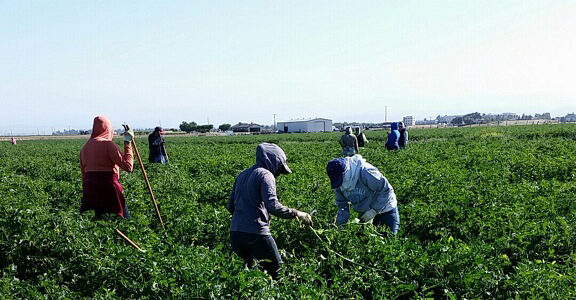Farm labor is some of the most physically punishing work out there. Farmworkers face a variety of hazards – ranging from muscular and skeletal injuries from lengthy stooping, lifting and cutting – all the way to respiratory, machinery, and vehicle hazards.
But local farmworkers also face a lengthy list of hazards related to Central Valley summers, including:
• Polluted Central Valley air: Summer heat traps particulates and ozone throughout the summer. That’s a hazard for anyone outdoors, but especially for those who spend all day working outdoors like farmworkers.
• Exposure to pesticide-treated fields and Valley Fever spores; a respiratory hazard, and a health issue in the long term.
• Heat stress and heatstroke. Even a short time working in triple-digit heat can lead to heat stress and heatstroke. But Central Valley farmworkers work the fields daily in that heat for months.
• Sun and UV exposure. With shade in the fields hard to come by and years spent working in the sun, farmworkers are at increased risk of skin cancer.
Summer safety for farmworkers is a daunting challenge. While “prevention” is sometimes cited as the best means keeping workers safe in the summer, the bigger picture is more complicated. Customary safety recommendations such as “avoid strenuous activity in the heat” and “avoid spending time outdoors in polluted air” are simply beyond farmworkers’ control. While the Farm Worker Safety Act of 2012 (FWSA) was intended to provide protection by mandating access to water, shade, and regular rest breaks, the FWSA’s long-term effect on farmworker safety is yet to be determined.
As we’ve discovered through our Mendota Project, farmworkers and their families in Mendota are also medically underserved. Mendota-area farmworkers may have to drive up to 40 miles to seek medical treatment after a long day in the fields. But with many of those farmworkers and their families lacking access to transportation, taking even one day off to see a doctor will mean loss of the day’s pay. And missing that day’s pay could mean no food on the table that night.
That’s one of the factors driving AMOR’s Mendota Project. Central Valley farmworkers are the hidden backbone of one of the world’s most productive agricultural regions. Through our work and partnerships in Mendota, one of AMOR’s goals is to transform health outcomes for farmworkers and their families, regardless of the season.
Learn more about AMOR’s Mendota Project.

